You can't fill in employment gaps on your resume without lying, so do this instead.
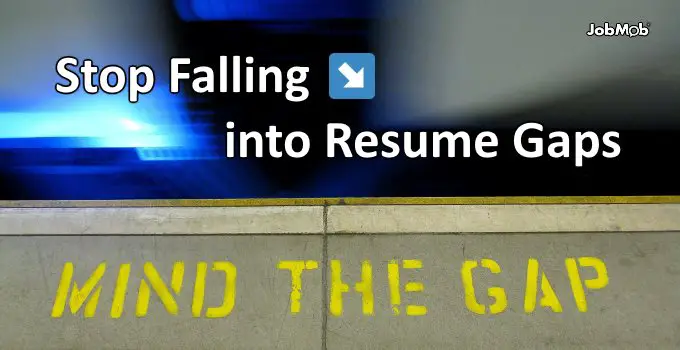
Need a better way to explain what you did between jobs?
Trying to re-enter the job market after a long time?
Here's how to explain your resume gaps.
(If your work gap(s) is longer than a year, how have you been explaining it until now? Tell us in the comments.)
Free bonus: The One Resume Resource You’ll Ever Need is a handy reference to make your resume get you more job interviews. Download it free now
How I explained my gaping resume gap
Not all resume gaps are signs of poor job searching, sometimes there are good reasons for gaps in employment.
During my job search in 2006, the question was often phrased like this:
“I see that you worked at Amazon.com in France until August 2001, but that your next job only began over a year later in October 2002. What happened there?”
I would usually grin out of familiarity with the question and then reply with something like this:
“In August 2001, I resigned from my managerial position at Amazon.com in France because I wanted to move back to Israel.
My plan was to take some time off to get settled in Jerusalem properly, without rushing, and then relax because I was exhausted from working at Amazon.
Once I was feeling energized and ready to go back to work, I began evaluating what my best career options would be locally. Unfortunately, by the time I began looking for work in December 2001, the Dot-com Bust (or ‘Internet Crash', as they said here in Israel) was in full swing, companies were closing, hitech (tech industry) people were being laid off left and right, and almost none of them were going to be replaced.”
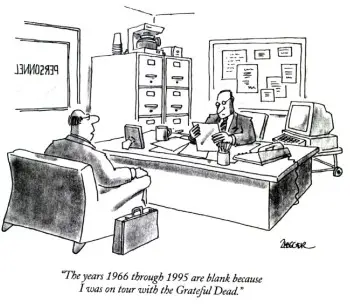
(At this point in the story, the Human Resources rep. or hiring manager is usually nodding because they too remember what it was like during that tough time.)
“I spent the next 8 months looking for work like so many other people, receiving only a few offers that I had to refuse because they didn't make sense financially.
One company offered to pay LESS than minimum wage to hire me as a Senior Project Manager (a position that normally earns 8-10 times that amount). I would have had to take a second job to pay all my bills. Good thing I didn't join them, they went bankrupt 3 months later.
In the summer of 2002, one of my former bosses from Amazon said that if I came back to France he would give me a terrific job with his new company. With my savings dwindling and an appealing offer in hand, I couldn't refuse.
However, it still took a few more months before I could start my new job because now I needed to move from Jerusalem back to Paris and get settled in there. In parallel, my new company wasn't even ready for me yet so the timing worked out well for both sides, and I finally began working in October 2002.”
Why this resume gap story works
Let's analyze that answer to the resume gap question:
- “In August 2001, I resigned from my managerial position at Amazon.com in France because I wanted to move back to Israel.”
I wasn't laid off or fired, I resigned. It was my choice to become unemployed.
- “My plan was to take some time off to get settled in properly, without rushing, and then relax because I was exhausted from working at Amazon. Once I was feeling energized and ready to go back to work, I began evaluating what my best career options would be locally.”
Needing time after a transcontinental move is very understandable to get settled in, and it takes more than a week.
Saying that “I was exhausted from work” is a mistake unless you can convince the interviewer that it won't happen again at their company. That said, everyone knows that hard work is tiring and this “slip” of truth can actually work in your favor by showing your honesty.
- “Unfortunately, by the time I began looking for work in December 2001, the Dot-com Bust was in full swing, companies were closing, hitech people were being laid off left and right, and almost none of them were going to be replaced.”
Anyone who's been through the ordeal will remember what it's like to be in industry- or economy-wide recessions, and how difficult the job market is during those moments in time. No one will fault you for getting caught up in such events that were clearly out of your control.
- “I spent the next 8 months looking for work like so many other people, receiving only a few offers that I had to refuse because they didn't make sense financially. One company offered to pay LESS than minimum wage to hire me as a Senior Project Manager. I would have had to take a second job to pay all my bills. Good thing I didn't join them, they went bankrupt 3 months later.”
(The same goes when explaining resume gaps due to illnesses, and that includes mental illnesses and depression. If it was out of your control, say so and people will usually understand.)
Not only was it my choice to become unemployed, it was my choice to stay unemployed. Also, it was worth pointing out that although there weren't many, I was still getting offers during a tough time.
- “In the summer of 2002, one of my former bosses from Amazon said that if I came back to France he would give me a terrific job with his new company. With my savings dwindling and an appealing offer in hand, I couldn't refuse. However, it still took a few more months before I could start my new job because now I needed to move from Jerusalem back to Paris and get settled in there. In parallel, my new company wasn't even ready for me yet so the timing worked out well for both sides, and I finally began working in October 2002.”
Any HR rep. or recruiter knows that a hiring process can take a few months before the candidate actually becomes an employee.
Finally, it's important to emphasize that when telling this story to recruiters during my 2006 job hunt, I wasn't an expert on job search. My above reply was a result of simply trying to tell the truth in a positive light and seeing how people reacted, including their followup questions or remarks.
7 tips for explaining your own work gaps
1) Be honest
Don't try to hide the gap. Many people have prolonged periods between jobs, at least once in their career. Think of how many stay at home moms try to re-enter the job market once their kids get older!
Having a resume gap is not so unusual, so don't make it seem to be unusual.
2) Show it off, even
If you took advantage by using the time between jobs to improve your skills or otherwise make yourself into a more valuable candidate.
3) Emphasize it was by choice (if true)
Put a positive spin by explaining how you were selective when targeting companies or contemplating job offers.
4) Use history
If your resume gap overlaps a period of difficulty in your entire industry or your country's economy, mention it. In 2020, the coronavirus outbreak is disrupting many job searches. Or- perhaps you weren't job searching the whole time but there was a major event in your personal life that required extraordinary attention. ‘Going historical' works especially well if the job interviewer can empathize because they may have experienced the same event.
5) Make your resume gap a non-issue
How? By listing directly on your resume what you did during the time between jobs, especially if the time was regularly spent in a framework such as a school or volunteering program.
6) De-emphasize resume gaps with a functional resume
Resume gaps stand out in a chronological resume, the classic resume type that details your work history over time and, by literally reading between the lines, your non-work history. Using a functional resume emphasizes your skills and achievements over the aspect of time.
7) Just avoid resume gaps outright…
By job searching intelligently so that you don't need to search longer than necessary. Improve your job search skills before you need them, at the very least by following blogs like JobMob even while you're still employed.
What others are saying
- Long-Term Unemployed? 5 Options to Bridge That “Employment Gap”
- Job Hopper? 6 Quick Fixes to Cover Resume Gaps
- Explaining The Gap: Dos and Don’ts
- Closing A Career Gap On Your Resume
Question of the article
Should resume gaps matter? Aren't your work accomplishments more important than what happened when you were off work? Tell us in the comments.
Bonus: How to explain gaps in your resume (how to explain a career break) | Employment gaps resume examples
Free BonusIf you want a handy resume and CV resource that you can keep on your smartphone or print out for easy reference, this special bonus is for you.
This free download contains:- 111 Smart Resume Section Headings and Titles
- 60 Resume Achievement Writing Ideas and Expressions
- 500 Positive Resume Action Verbs That Get Job Interviews
- 35 Resume Filenames Recruiters Won’t Respond To
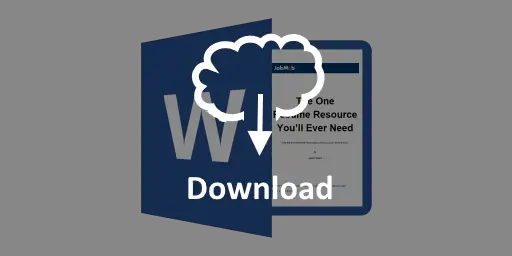
JobMob Insiders can get this free bonus and other exclusive content in the JobMob Insider Bonuses area. Join now, it's free!
Subscribe to JobMob via email and follow me on Twitter for more useful resume gap insights.

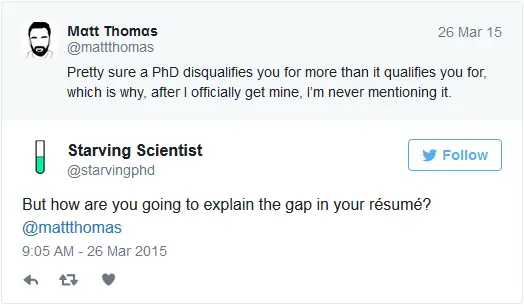
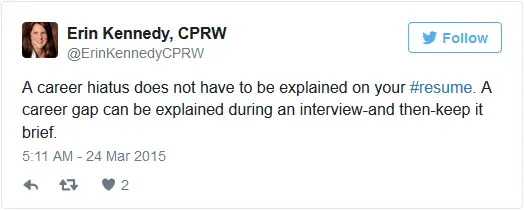
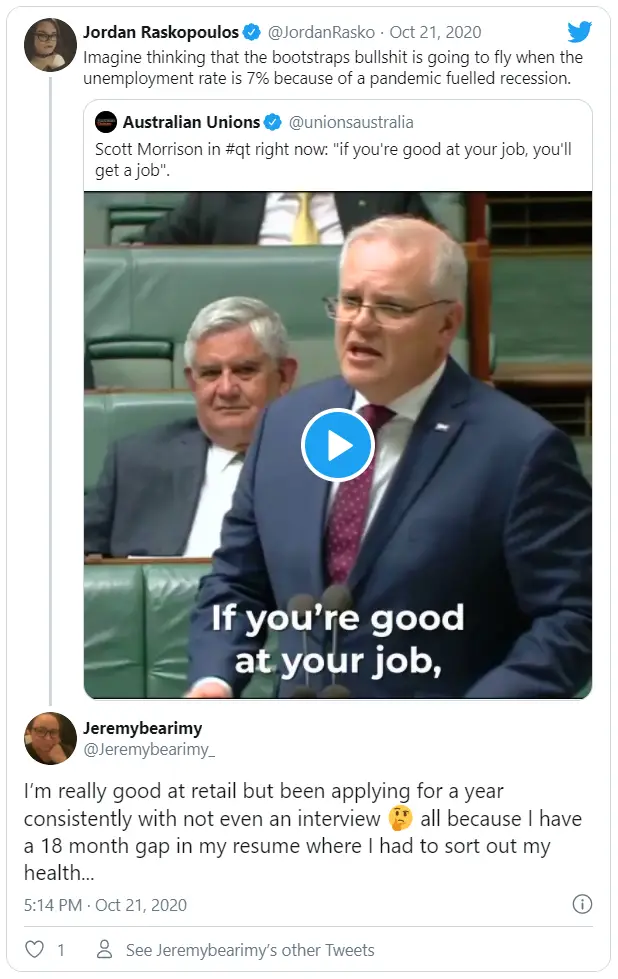
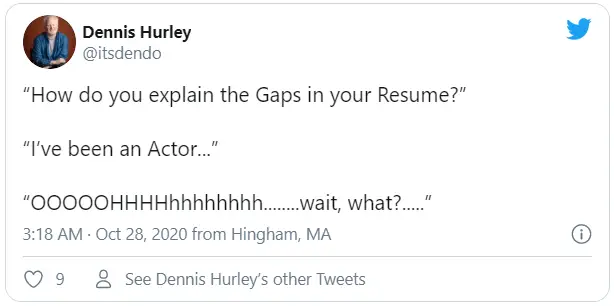
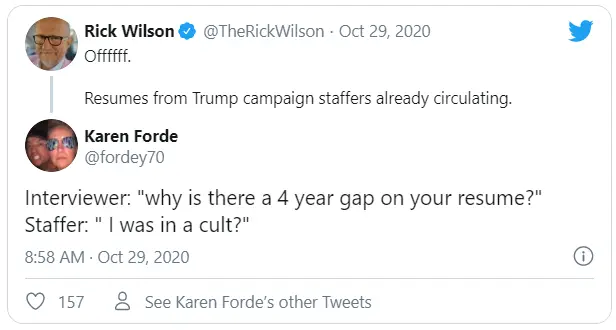
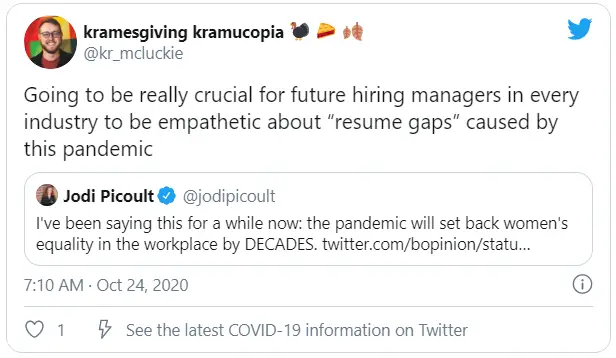

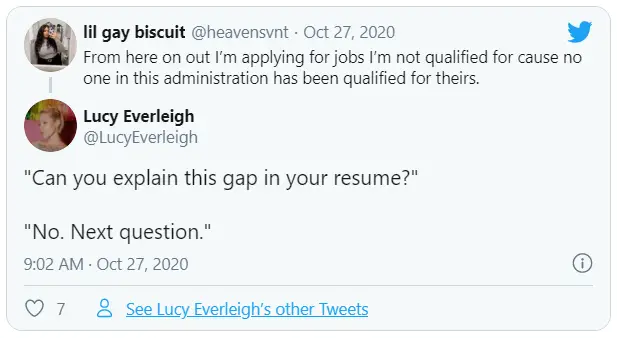
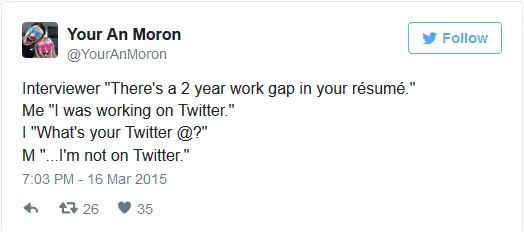


Pingback: Resume Gaps: How To Explain Them, How To Avoid Them | JobMob « ANDYWERGEDAL
Pingback: Joanna Maxwell
Pingback: Kate James
Pingback: Mark Kattoura
Pingback: HowmanyJobs
Pingback: UTT CAREER SERVICES
One of the best ways to hide gaps in a resume that I recommend to my clients is to do the following:
Specify your periods of emplyment at various companies in ‘years’, for example
At Company X, 2001 – 2004
At Company Y, 2004 – 2009
At Company Z, 2009 – Present
This works great so long as your gap was < 1 year. Simple!
Chris- clever! You still need to have a good reply ready for when the interviewer digs further.
Nice post, Jacob! The example from your own life illustrates the ideas you are setting forth very well.
I’m curious — what would you suggest a person could do if the gap is due to a medical issue? For example, I’ve heard of people who have been out of the workforce for a couple years battling cancer. How do you talk about that without causing the interviewer to be concerned about future health issues cropping up?
i would like to join this is so helpful.
Pingback: Fatima
Melissa- like I say above, you want to be honest, but being honest doesn’t mean telling everything.
Suppose I was sick and away from work from 2006-2008. In this case, I would add to my resume:
2006-2008 Sick leave
That’s it.
Using a chronological resume, I’d include that mention among the jobs listed under Work Experience or equivalent.
Regarding the second part of your question- except for an Objective section, the resume should only discuss the current and the past.
People get sick, unfortunately, but it shouldn’t be a strike against them. There’s no reason to try and predict the future by implying someone may get sick again. It could happen to anyone.
Privacy laws may prevent an interviewer from asking about the sickness, but if they do, honesty is the best policy. Any speculation about remission is just that, speculation, and not worth mentioning.
Pingback: Staffbuzz
Pingback: Insight 2 Talent
Pingback: Rosa E. Vargas
Pingback: Resume Chicks
Pingback: Lucien de Freitas
Pingback: MacombCareerServices
Hi Jacob, Thanks very much for referencing the article on my site. I love your approach in this article explaining what you said. It definitely helps when people talk about their history as a story, and a choice that they have made. It becomes something the interviewer can relate to, then.
Hello Jacob;
I am in the process of being interviewed for a new full time position. I have a bit of a gap in my resume due to taking sick leave. The reason for my leave was physical burnout and depression. During the time that I was off made the decision not to go back to my old employment. Instead I enrolled in school and got myself retrained. My resume shows that I resigned in 2009 however I did not include the month that I resigned. My resume shows that I graduated from college in January 2010. Should I attach the actual months that I left? My experience has been that as so as the word “depression” hits the conversation that the way you are seen changes. I really would like to grab this position and I haven’t felt this good in a very long time. Suggestions?
Cletus- On a resume, it’s very important to be consistent. In your case, don’t include the months for any of the past jobs or academic programs you completed. That said, this really is a detail and the question might still come up about your sick leave.
If it’s not necessary to explain why you were on sick leave, don’t. If you feel compelled to respond, be truthful but emphasize how you overcame the problem and have no reason to believe it will reoccur. The employer-to-be wants to be comforted that this isn’t something they’ll need to worry about, that’s all.
I think you are analyzing this too much. I have tons of gaps and I just say I was working on myself – because that’s what I do. I grow and evolve and develop when I am not working. I have a 95% offer rate. Get over this gap nonsense. When we are expected to be agile and flexible as a workforce, we are not answerable to gaps.
BTW, you folks are gonna have a harder time getting jobs because of your beliefs in black and white ideas.
Pingback: Why You Must Freelance Between Jobs (and How To Get Started) | JobMob
Pingback: Laid Off or Fired: Why It Matters Which | JobMob
Pingback: 444 Most Popular Job Interviewer Questions To Prepare Yourself With | JobMob
I think it’s time employers got a clue that life happens to people too.
As an IT contractor, I have recently taken several short (3 month) contracts over the last 2 years. There are some gaps in between the contracts but nothing more than a couple of months.
The problem I have is that some recruitment agencies dismiss my application because I have taken short contracts. They say “my client wants to see long term commitment”, which really translates as “my client is worried that you have a history that looks like the previous clients may not have wanted to renew or extend the contract”.
This is not the case. I have had some contracts that have ended due to the client running out of funding (public sector) and I have capitalised on taking the work when it presented its self, knowing it was short term. Work is work and there is a market for short term back fill roles. My question is how do you make the CV look enticing enough to counter the “short term prejudices”?
Dan- you can:
a) only target companies who have a history of hiring contractors i.e. people who won’t shudder at your CV
b)make your CV an afterthought by getting referred to openings by credible references and/or by explaining up front and in detail why your recent short stints shouldn’t be a concern for the employer at hand
Thanks Jacob,
Your site is very helpful and I have found a number of tips to help me.
A lot if not most of my applications are via job boards. Agencies place the adverts not the hiring company. Quite often the agency won’t tell you who the client is until they have spoken to you and feel that you are marketable to their client. Also the majority of large corporate companies prefer to use agencies to filter the first round and won’t accept direct approaches..
Glad you’re enjoying JobMob!
Large job boards are good for gauging demand, not applying for jobs- as a public listing, you’re competing against untold numbers of candidates. Local job boards that most public are unlikely to know are a better bet for job seekers but even then you can do much better with a little research and/or networking.
You’re right about corporate recruiting practices but you can usually avoid that filter by getting referred internally and/or building a personal brand that gets an employee’s attention, which leads to the same thing.
Thanks, that is such a good idea. I should market myself as a brand and start building contacts with the organisations I want to get in to. In essence I should thinking like a contractor hunting for jobs and start thinking like a business looking for clients.
Exactly.
That will also prepare you for what’s being called the emerging ‘Gig Economy’ where everyone is a freelancer.
Just did a refresh of this article for 2017 🌟
Pingback: 🏃 7 Ways To Speed Up Your Job Search Results
Pingback: 🙉 Common Bad Job Search Advice To Ignore Every Time
Pingback: 🎸 365 Top Tips to Rock Your Job Search Every Day of 2020
Pingback: 😷 15 Ideas For Job Seekers To Do While Lonely in Coronavirus Quarantine
Pingback: Stop Falling into Resume Gaps | The Big Game Hunter
Pingback: 15 Ideas For Job Seekers To Do While Lonely in Coronavirus Quarantine